*** Special to The BRAD BLOG
*** by Libby/CIA Leak Trial Correspondent Margie Burns
 From Prettyman Courthouse, DC, for the bail hearing today of I. Lewis "Scooter" Libby, where I sat in on the hearing on motions for his pending appeal. Those motions, to keep him free on bail, were unsuccessful as the judge ruled against the defendant.
From Prettyman Courthouse, DC, for the bail hearing today of I. Lewis "Scooter" Libby, where I sat in on the hearing on motions for his pending appeal. Those motions, to keep him free on bail, were unsuccessful as the judge ruled against the defendant.
Approximately 11:30 this morning, U.S. District Court in DC, Judge Reggie B. Walton: “In the interest of full disclosure,” Walton says quietly, “and this may be a sign of the times we live in,” in the wake of his ruling which sentenced Libby to prison, “I have received a number of angry, mean-spirited phone calls and letters regarding the sentence” – “including wishing bad things on me or my family.” – “At first I threw them away, but then I got more letters, even more hateful than the others.” So now, “I’m preserving them – in the event that something does happen [some harm to the judge, presumably]” – the perps can be caught.
The times we live in, indeed. Chalk another smarmy mark up for the noise machine.
On to the bail hearing today: the judge refers to a lengthy footnote in the most recent defense motion which lists a number of convicted criminals who are out on bail – “that list of people out on bail, in white-collar crime cases” [everybody from Martha Stewart on down, out on bail while pursuing appeal] – “I hope that footnote is in there not just because of some assumption that people released pending appeal will include all white-collar defendants.” – “I can’t buy in on that,” Walton says, taking the position that white-collar defendants should be treated the same way as blue-collar defendants, and neither kind of defendant should count automatically on being released on bail pending appeal...
Two new attorneys are introduced on the Libby defense; they will lead the appeal: Lawrence Saul Robbins and Mark Thomas Stancil.
The judge’s position sounds reasonable to me, and maybe to the defense too: Robbins responds that the point of said footnote is “only to show that reasonable judges can disagree.”
Robbins, for the defense, says three main issues will be brought up on appeal, only one of which he will go into at length, the other 2 only briefly. The lengthy one is the Appointments clause question, already the topic of an amici brief and an earlier BRAD BLOG article, where several law professors argued in their friend of the court brief to Walton, that Special Counsel Fitzgerald's appointment may have been unconstitutional because he was not properly overseen by a controlling authority.
The judge points out, among other things, that according to the precedent, you have to look at the particular circumstances that apply in a particular case.
Robbins argues that 1) “the power to remove w/out the power to supervise” shows that Special Counsel Fitzgerald was not controlled; 2) the Special Counsel had “the broadest delegation” of authority he’d ever seen, or words to that effect; 3) “what happens when someone has no supervisor is that sometimes things go wrong.”
Robbins, by the way, takes a somewhat personal tone in the argument, different from that of defense attorneys Wells and Jeffress during the trial: “nobody who’s just AG for a day” should do such-and-such; “he thinks he’s the AG”; etc; regarding the Special Prosecutor Fitzgerald.
The 2 much weaker issues, all sides seem to agree, for appeal are a) the exclusion from trial of the testimony of a credentialed memory expert; and b) the exclusion of testimony from NBC reporter, Andrea Mitchell. Robbins spends very little time on both.
Then Robbins wraps up his Appointments clause argument by bringing up the amici brief, already posted about: twelve prominent law professors, Robbins points out, all legal experts in constitutional law, all are in agreement on this point (about the Appointments clause).
For the record, here, from the US Constitution, is 'the Appointments clause' --- Article II, Section 2, Clause 2.
Judge Walton says that he saw the amici brief, and says “that submission was not something I would expect from a first-year law student” – i.e. it was not very good, thorough – and suggests that it looks as those eminent “names are thrown out there” – pretty much in the hope that he would feel pressured to rule as they wanted him to, “just because they said something.” – Robbins gamely responds that these are all people in good faith, “twelve law professors who usually can’t agree on the best way to make change for a nickel,” disagreeing on other issues, but all agreeing on the appointments clause.
Judge Waltonn: “maybe if I’d received something of more substance from them” the amici brief would have had more impact, he says about the very brief 5-page brief. Robbins answers that the amici authors probably just didn’t want to repeat all the arguments already made by the defense.
It is now the government’s turn to respond. Special Counsel Fitzgerald, rising first, points out:
- re the clarification letter of Feb 6, 2004 from Comey, cited by Robbins: Fitzgerald says that “I was not leaving my job”; “I was bound by the rules of the DOJ.” – In other words, he was still an ‘inferior officer’ as the term is used. “In Chicago, in NY, Assistant US Attorneys conduct CIPA proceedings,” Fitzgerald says; you can’t say they’re not inferior officers.
- Re that argument that the Special Counsel was let loose on a wide range of encompassing “related” matters – giving him too broad a power, --- Fitzgerald says “I wasn’t asked to investigate a person, I was asked to investigate a crime,” – and not under just one statute. – He was appointed to investigate violations of law regarding the leak of classified information, and the investigation and prosecution were conducted under that assignment.
- “the notion that people didn’t know what we were doing?” – “everybody in the world knew about it,” Fitzgerald remarked. – “I’m firable at will. Nobody fired me afterward.”
Debra Bonamici, up next for the govt, ably summarizes and clarifies the main points:
In regard to 2 cases cited, Morrison and Edmonds, Supreme Court precedent in both involves the “circumstances in each particular case.” And “being removable at will was a crucial, crucial factor,” Bonamici adds – “or being removable at all.”
On the question of supervision, Bonamici argues politely but firmly that the Special Prosecutor was not relieved of “any obligation” to follow DOJ policy and procedure – the notion is “ridiculous,” Bonamici says, that a US Attorney assigned to another investigation is somehow removed from all DOJ regs and policies.
The idea that neither George W. Bush, nor the Attorney General knew about progress of the case is also “ridiculous,” she adds. The two big issues in Morrison are removability (of the officer), and obligation to comply with DOJ regulations. – Personnel from the executive branch were witnesses, testifying in the investigation and even in the trial, she points out; “the idea that they didn’t know what was going on is made up.” The defense team is “broadening” – to say that the Prosecutor had no obligation to comply with “any” regulations because of some exemptions; also it is artificially broadening, in a case where you’re investigating conduct rather than a particular crime, to broaden this to mean that Special Prosecutor Fitzgerald was absolutely unsupervised, free of all regulations and policies, is again “ridiculous.”
Judge Walton agrees with both sides in effect that neither the exclusion of the “memory” defense nor the exclusion of Andrea Mitchell are 'close questions,' i.e. likely shots on appeal. – The judge points out that the jury was agreed on 4 of 5 counts from very early on in their deliberations, with no big problems re the testimony by Tim Russert, which is the part of the trial that Andrea Mitchell's testimony would pertain to – leaving as the only conceivably ‘close question’ the Appointments clause.
Bonamici summarizes one final point, that for now the Morrison case is the binding precedent, and the Morrison case emphasized 4 factors re defining an ‘inferior officer’: removability, limited responsibility, and no power to make policy, as well as the duty to report.
After a short break, the judge comes back: As a “prelude” to his ruling, Walton says, to suggest that because he has written lengthy opinions in support of his rulings (on the memory defense, etc), the length of the ruling is a reflection that the question is therefore ‘close’ is not true. “As judges, including as trial judges, we have an obligation to try and get it right.” While acknowledging that an appellate judge might see it differently, Walton says, “I don’t buy the proposition that somehow Edmonds altered what Morrison said” regarding the Appointments clause.
Walton concludes that it is appropriate to apply Morrison’s 4 factors in defining an inferior officer at some times and Edmonds’ 2 factors at other times, depending on the circumstances of the case, and mentions Scalia’s dissent saying that if Morrison had been removable, she would have been an ‘inferior officer.’ “I don’t think there’s any question that Mr. Fitzgerald was removable at will by the Attorney General or the Deputy Attorney General.”
The defense motion for release pending an appeal (release on bail) is denied.
Libby will be permitted to “self-report.” The Bureau of Prisons has to make its report, telling him when and where to show up.
Robbins rises again, to request a stay while the defense appeals the ruling denying release pending appeal. This motion is also denied.
1:35 p.m. “All rise.”


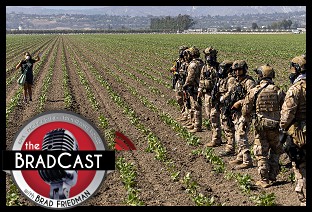 Trump Labor Dept. Warns Trump Policies Sparking Food Shortage, Farmworker Crisis: 'BradCast' 10/9/25
Trump Labor Dept. Warns Trump Policies Sparking Food Shortage, Farmworker Crisis: 'BradCast' 10/9/25 'Green News Report' 10/9/25
'Green News Report' 10/9/25
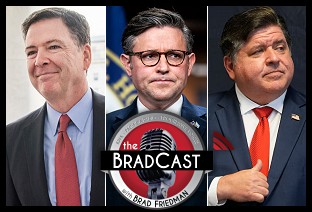 Trump's Losing Battles: 'BradCast' 10/8/25
Trump's Losing Battles: 'BradCast' 10/8/25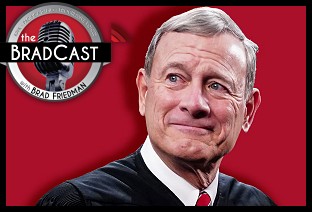 'Supreme Arrogance': Trump, John Roberts and His Stacked, Packed and Captured SCOTUS: 'BradCast' 10/7/25
'Supreme Arrogance': Trump, John Roberts and His Stacked, Packed and Captured SCOTUS: 'BradCast' 10/7/25 'Green News Report' 10/7/25
'Green News Report' 10/7/25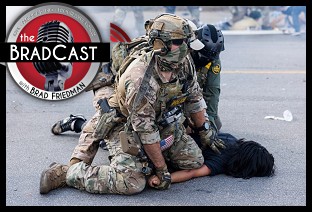 Trump Attempting His
Trump Attempting His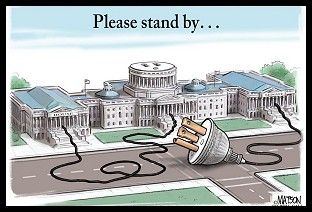 Sunday 'Shutshow' Toons
Sunday 'Shutshow' Toons Biden Budget Expert: Mass Firings in Shutdown 'Extremely Illegal': 'BradCast' 10/2/25
Biden Budget Expert: Mass Firings in Shutdown 'Extremely Illegal': 'BradCast' 10/2/25 'Green News Report' 10/2/25
'Green News Report' 10/2/25 Why is DOJ Suing 'Blue' States for Their Voter Databases?: 'BradCast' 10/1/25
Why is DOJ Suing 'Blue' States for Their Voter Databases?: 'BradCast' 10/1/25 'A War from Within' Trump's Twisted Mind: 'BradCast' 9/30/25
'A War from Within' Trump's Twisted Mind: 'BradCast' 9/30/25 'Green News Report' 9/30/25
'Green News Report' 9/30/25 'Fear is the Tool of a Tyrant':
'Fear is the Tool of a Tyrant': Sunday 'Long Arm/Small Man' Toons
Sunday 'Long Arm/Small Man' Toons 'Green News Report' 9/25/25
'Green News Report' 9/25/25 I Don't Know What This Means, But I Thought You Should Know: 'BradCast' 9/25/25
I Don't Know What This Means, But I Thought You Should Know: 'BradCast' 9/25/25 Gov't Shutdown Looms as Dems Fight to Save Healthcare Subsidies: 'BradCast' 9/24/25
Gov't Shutdown Looms as Dems Fight to Save Healthcare Subsidies: 'BradCast' 9/24/25 Updates: Homan Bribery; Kimmel Censorship; Our Insane Prez at U.N.: 'BradCast' 9/23/25
Updates: Homan Bribery; Kimmel Censorship; Our Insane Prez at U.N.: 'BradCast' 9/23/25 Trump 'Border Czar' Took $50k in Sting, DOJ Dropped the Case: 'BradCast' 9/22/25
Trump 'Border Czar' Took $50k in Sting, DOJ Dropped the Case: 'BradCast' 9/22/25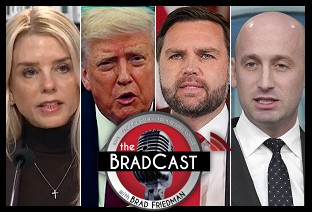 MAGA Exploiting Kirk's Death as Their 9/11: 'BradCast' 9/17/25
MAGA Exploiting Kirk's Death as Their 9/11: 'BradCast' 9/17/25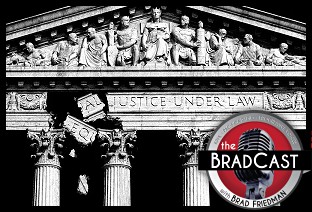 Our Crumbling Courts and Withering Rule of Law: 'BradCast' 9/16/25
Our Crumbling Courts and Withering Rule of Law: 'BradCast' 9/16/25 After Kirk Murder, 1st Amendment, Not 2nd, Under Attack: 'BradCast' 9/15/25
After Kirk Murder, 1st Amendment, Not 2nd, Under Attack: 'BradCast' 9/15/25 SCOTUS Suspension of 4th Amendment an Ominous Threat to Constitutional Republic
SCOTUS Suspension of 4th Amendment an Ominous Threat to Constitutional Republic
 VA GOP VOTER REG FRAUDSTER OFF HOOK
VA GOP VOTER REG FRAUDSTER OFF HOOK Criminal GOP Voter Registration Fraud Probe Expanding in VA
Criminal GOP Voter Registration Fraud Probe Expanding in VA DOJ PROBE SOUGHT AFTER VA ARREST
DOJ PROBE SOUGHT AFTER VA ARREST Arrest in VA: GOP Voter Reg Scandal Widens
Arrest in VA: GOP Voter Reg Scandal Widens ALL TOGETHER: ROVE, SPROUL, KOCHS, RNC
ALL TOGETHER: ROVE, SPROUL, KOCHS, RNC LATimes: RNC's 'Fired' Sproul Working for Repubs in 'as Many as 30 States'
LATimes: RNC's 'Fired' Sproul Working for Repubs in 'as Many as 30 States' 'Fired' Sproul Group 'Cloned', Still Working for Republicans in At Least 10 States
'Fired' Sproul Group 'Cloned', Still Working for Republicans in At Least 10 States FINALLY: FOX ON GOP REG FRAUD SCANDAL
FINALLY: FOX ON GOP REG FRAUD SCANDAL COLORADO FOLLOWS FLORIDA WITH GOP CRIMINAL INVESTIGATION
COLORADO FOLLOWS FLORIDA WITH GOP CRIMINAL INVESTIGATION CRIMINAL PROBE LAUNCHED INTO GOP VOTER REGISTRATION FRAUD SCANDAL IN FL
CRIMINAL PROBE LAUNCHED INTO GOP VOTER REGISTRATION FRAUD SCANDAL IN FL Brad Breaks PA Photo ID & GOP Registration Fraud Scandal News on Hartmann TV
Brad Breaks PA Photo ID & GOP Registration Fraud Scandal News on Hartmann TV  CAUGHT ON TAPE: COORDINATED NATIONWIDE GOP VOTER REG SCAM
CAUGHT ON TAPE: COORDINATED NATIONWIDE GOP VOTER REG SCAM CRIMINAL ELECTION FRAUD COMPLAINT FILED AGAINST GOP 'FRAUD' FIRM
CRIMINAL ELECTION FRAUD COMPLAINT FILED AGAINST GOP 'FRAUD' FIRM RICK SCOTT GETS ROLLED IN GOP REGISTRATION FRAUD SCANDAL
RICK SCOTT GETS ROLLED IN GOP REGISTRATION FRAUD SCANDAL VIDEO: Brad Breaks GOP Reg Fraud Scandal on Hartmann TV
VIDEO: Brad Breaks GOP Reg Fraud Scandal on Hartmann TV RNC FIRES NATIONAL VOTER REGISTRATION FIRM FOR FRAUD
RNC FIRES NATIONAL VOTER REGISTRATION FIRM FOR FRAUD EXCLUSIVE: Intvw w/ FL Official Who First Discovered GOP Reg Fraud
EXCLUSIVE: Intvw w/ FL Official Who First Discovered GOP Reg Fraud GOP REGISTRATION FRAUD FOUND IN FL
GOP REGISTRATION FRAUD FOUND IN FL

































